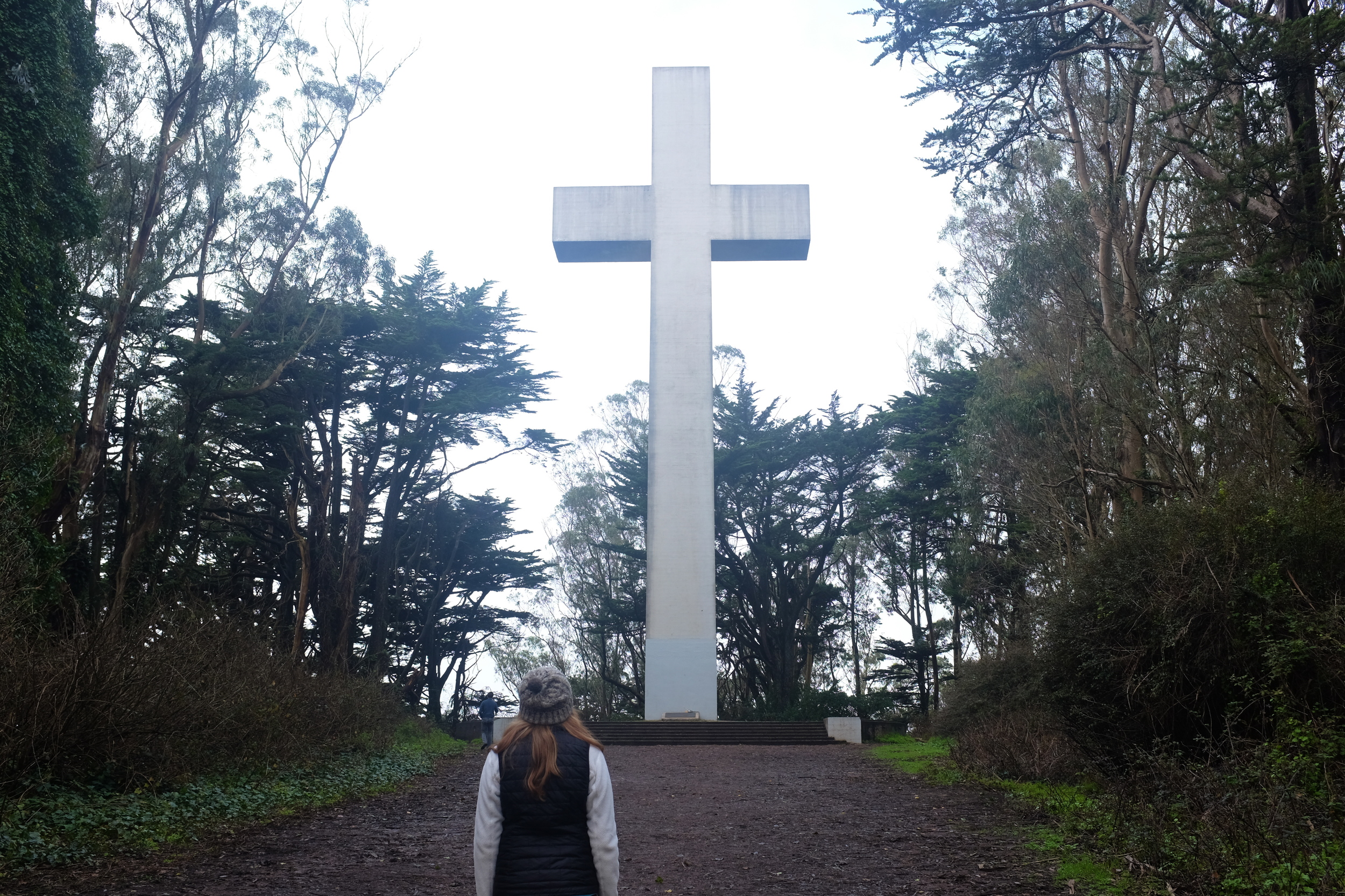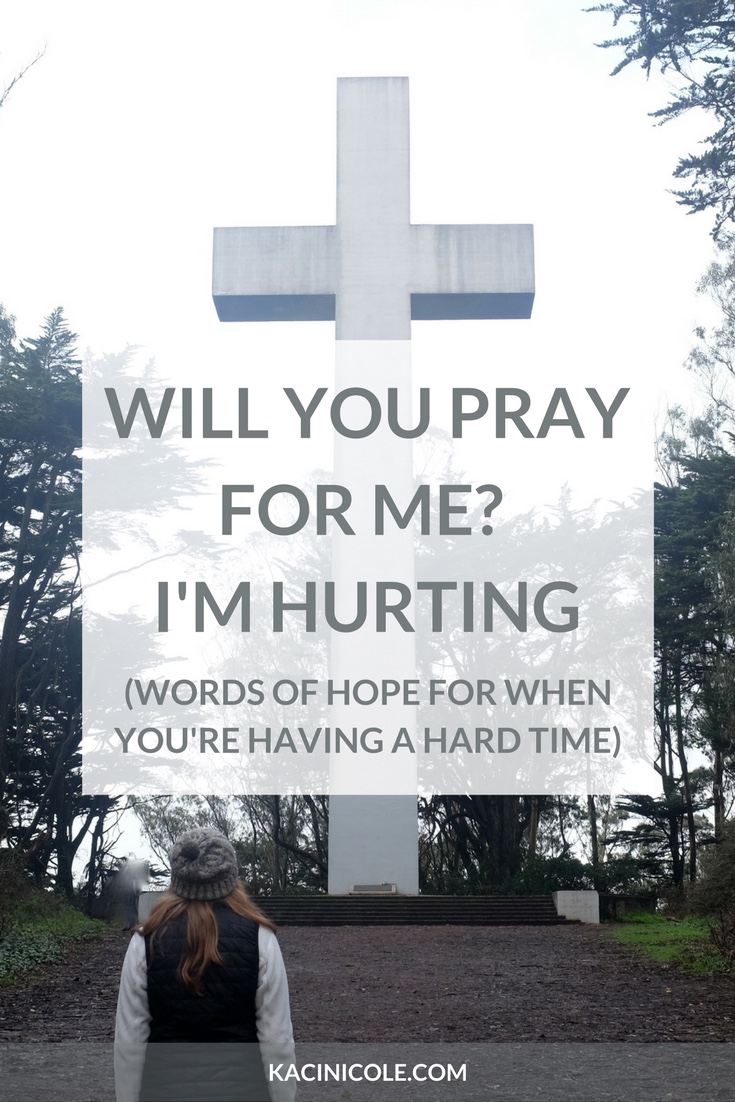
I was halfway through a slow Saturday morning of cleaning and catching up on laundry when my phone buzzed atop my dresser, alerting me to a text.
I picked it up and the following words flashed across its screen:
>
“Will you please pray for me? I can’t explain right now, but I’m hurting and I feel like it just won’t go away. I’m tired of crying. We’ll talk soon, but for now will you be praying?”
These words belonged to a beautiful, dear friend and when I read them, my heart sank for her because I knew well what it was like to be in that place.
I knew the helplessness of feeling so overcome with hurt and sadness, but being too emotionally depleted to attempt to make sense of it for someone else, when it was confusing even to me. I knew that tension of wanting to feel supported in a struggle, but too numb to explain what was going on, and lacking the energy to try. I knew what it was to wonder if the pain would ever go away.
When I saw my friend’s words, I desperately wanted to press in and ask questions, to offer comfort and encouragement. But I knew that urge had more to do with me feeling helpful than actually providing the help she needed. What she needed in that moment was to be lifted up in prayer, so I began to pray.

A few years ago, when I was still in college at Biola University, I walked through a season where that pain became far too familiar. I’d just stumbled out of a situation that left me feeling lost, rejected, and hurting. I was desperate for the approval of people and lived in fearfulness of not receiving it. Pain stemmed from believing lies about who I was. I asked God for healing and peace, but with each “amen,” nothing seemed to change. I longed for the joyful and confident Christian I thought I was supposed to be and though there were moments, underneath it all was a persistent ache.
The thing about the thorns of life, painful as they may be, is that they keep us leaning into Jesus. When life’s all roses, it’s easy to get independent and go about our days as if we don’t need Him. The thorns, they keep our gaze firmly fixed on His face.
One especially difficult day during this season, I found myself hopping in my car to make the short drive from my apartment over to campus, followed by a quick walk down the courtyard steps towards an unassuming wooden door tucked away in a beautiful brick building. This had become a familiar route to me during those months. Beyond that door lay the Talbot East Prayer Chapel. Its soundproof walls made it a silent sanctuary, a cherished and comforting reprieve.
I’d made it through a day of lectures, exams, and papers with a smile on my face, and was trying with everything in me to keep it together for just a few more steps before releasing my heart onto worn journal pages and meeting with the Father in the silence of Scripture and that small room.
Only, as I approached the normally vacant courtyard, I saw tables filled with food, and Hawaiian shirts adorning a sea of Biola professors. My stomach dropped. Thankfully, the crowd was large enough, and otherwise engaged, that I was able to weave my way through to the prayer chapel undetected.
Or so I thought.
I’d just settled into my favorite spot and began praying when I heard the door crack open. I didn’t think much of it, assuming another student had come in, until a tall figure rounded the corner and I recognized my Johannine Literature professor, Dr. Matt Williams. His eyes were brimming with kindness and compassion, and they were directed at me.
“I’m sorry, I don’t mean to interrupt. I just saw you come in here and sensed that I needed to come after you. Are you okay?”
Surprised and mind spinning, I tried to twist my mouth into a smile. “Yeah, I’m okay. Thanks for asking.”
“Are you sure?” he asked, eyes gentle and discerning.
I debated internally for a second. Biola’s professors had always made themselves available for office hours, not just to talk about test scores and extra credit, but life. They offered prayer and wisdom and genuine care. Part of me had always wanted to reach out, but I was also afraid.
“Yeah, just going through some stuff, but I’m okay,” I said, letting fear win.
“Okay, well I’m praying for you,” he said, and began moving towards the door.
As the surprise subsided, I was struck by his kindness. More than that, I felt seen. I felt like God heard me, and cared enough to send someone after me.
“Wait!” I called.
He paused.
“I do want to talk. I’ll email you.”
A week later I walked into Dr. Williams office and by the time I walked out, I felt like I’d experienced Jesus in an entirely new way.
As I shared with him what had been going on in my life, he offered wisdom gleaned from years of working with students and from his own walk, wisdom prompted by the Holy Spirit. We talked about steeping ourselves in the Truth of who God says we are, and tuning out the lies of the enemy. In that office space, God used Dr. Williams to speak so many things I desperately needed to hear, but there was one thing especially I will never forget.
He had me sit silently while he read aloud to me Ezekiel 34, which is fulfilled by Jesus declaring Himself the Good Shepherd in John 10. Ezekiel 34 is a condemnation of the Jewish religious leaders, because they had not done a good job shepherding God’s people. They hadn’t cared for the “sheep” or sought after the lost or injured, but fed themselves instead.
Reading this chapter out loud, you can almost hear God’s voice begin to crack. His anger at the mistreatment of His people is accompanied by a profound sadness. The care of His people matters so deeply to Him that He declares “He Himself” will now be their Shepherd. He cares too much to entrust that responsibility to anyone else.
With each line Dr. Williams read, I felt that God was speaking directly to my heart.
“Behold I, I myself will search for my sheep and will seek them out…I will rescue them (v. 11).”
“I myself will be the Shepherd of my sheep…I will seek the lost, and I will bring back the strayed, and I will bind up the injured, and I will strengthen the weak (v. 16).”
“And they shall know that I am the Lord, when I break the bars of their yoke, and deliver them from the hand of those who enslaved them (v. 27).”
“They shall dwell securely, and none shall make them afraid (v. 28).”
My heart and my eyes quickly filled as I was overcome by a God who cared so fiercely about the care of His people. It MATTERED to Him that they were sought after. It MATTERED to Him that they were healed. It MATTERED to Him that they could dwell securely, free of fear.
It MATTERED to Him that those things would happen for me.
Monday night after the Saturday I received a text from my friend, I got together with her. Though her sadness was still present, hope was also rising. As she recalled to me what had happened in the two days since we’d talked, her eyes filled with tears, but this time, a different kind.
Sunday morning at church, her pastor had spoken on Psalm 56:8, which talks about how God cares enough about our pain that He bottles up our tears. Later on, she was doing her Bible study reading for the day, where she came across another verse, a promise of things to come:
>
“He will wipe away every tear from their eyes, and death shall be no more, neither shall there be mourning, nor crying, nor pain anymore, for the former things have passed away (Revelation 21:4).”
My friend was overwhelmed. She’d spent all Saturday crying, and was now overwhelmed by a God who SAW her pain, and loved HER enough to speak to her, offering comfort in the truth that He was WITH her.
God is a God who bottles up all of our tears, who is pained at human suffering, and who promises a day when there will be no more pain—a day when He will wipe every tear from our eyes.
That’s a beautiful God. What does He mean though, to someone who’s never known what it is to cry?
In my meeting with Dr. Williams, I fell in love with a side of Jesus who cared about bringing me the healing and freedom from fear I so desperately longed for, and cared enough to bring it Himself. This aspect of Jesus’ personhood impacted me in a way I’d never experienced. It’s something that’s stuck with me to this day.
But what need would I have for a Jesus who cares about my healing and freedom from fear if I hadn’t first known hurt or fear?
Our fallen world is filled with suffering. Sometimes the sheer vastness of it is overwhelming. God never promised a life without suffering, but He did promise to be with us IN it. And He did send His Son into the world to redeem it back to Himself, so that one day we may experience no more sorrow, and no more pain.
Pain was not a part of God’s perfect plan, but He refuses to waste it. He uses it—to shape us, and to show us more of who He is. Pain creates a hunger that is satisfied in the truth of Jesus’ personhood.
Whatever you have gone through or are going through, Jesus SEES you, and He LOVES you more than you know.

Biola’s Talbot East Prayer Chapel.
Hello I’m Kaci!
I love encouraging and discipling others in the Word of God, and I really love the One it all points to: Jesus.
FAVORITE VIDEOS
How To KNOW WHAT GOD WANTS You To Do
BIBLE STUDY WITH ME | James 1
SINGLENESS & DATING: Waiting on God, or Taking Initiative?




Beautiful post Kaci.
Thank you Lamar! Your kind comments are always so appreciated.
Such comforting words, thanks for sharing!
I’m so glad they were comforting to you—thanks for reading!
This spoke me to me so much. I come from a broken family and was just feeling like because my dad wasn’t a good father, how sometimes I feel like I’m missing out on parts in life. But God, through Ezekiel 34, is saying no I will be your father. I will take care of you. Thank you for this post. I was feeling so discouraged before I read this.
I’m so thankful God used this post to show you His heart toward you as your FATHER—that He is able to perfectly fulfill everything your dad wasn’t, though that lack is so painful and so real. Praying He continues to reveal Himself to you as Father and shows you how intimately He has been and will continue to care for you.